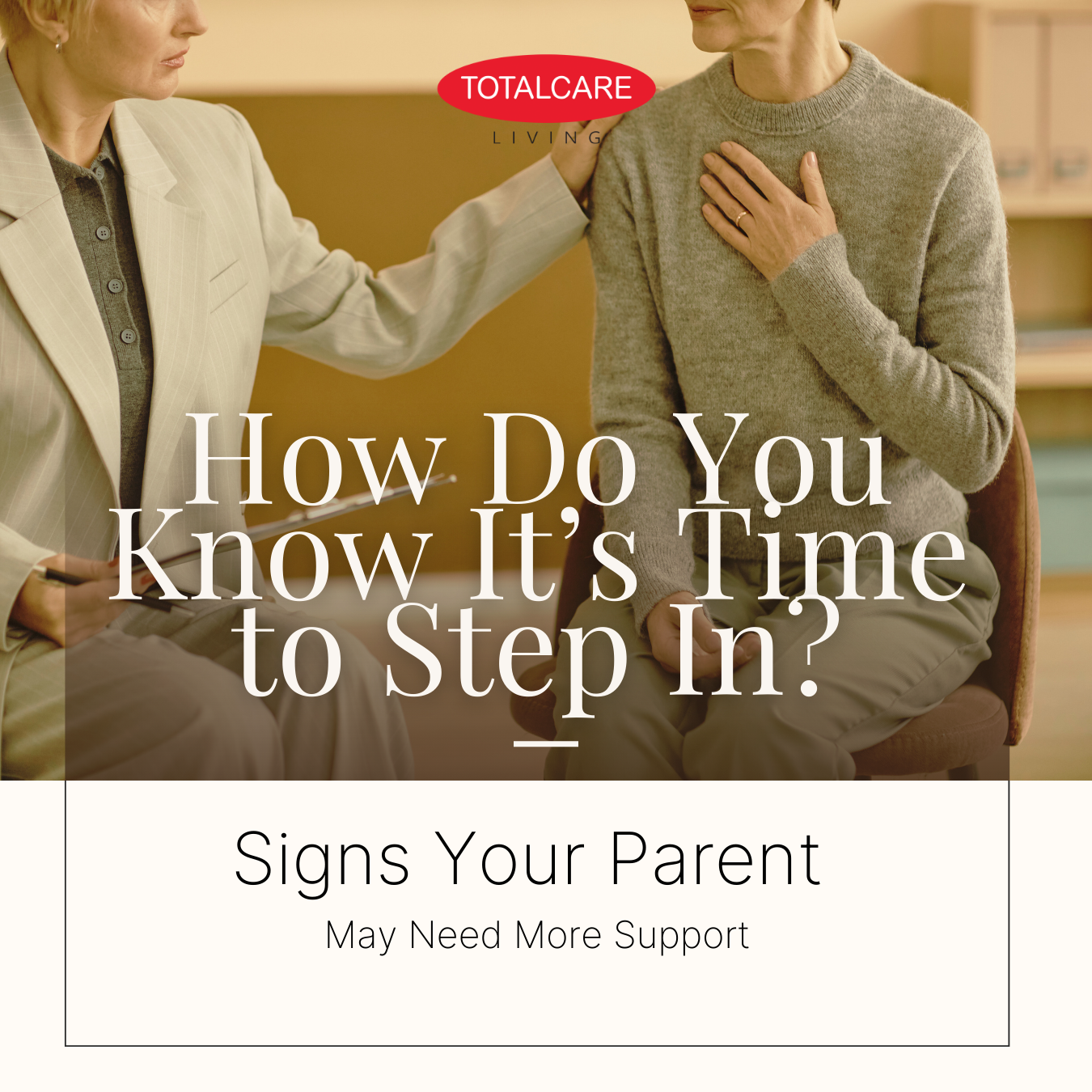
Ageing can bring subtle changes that are easy to overlook at first — a missed appointment, a forgotten meal, or a once-tidy home now slightly unkempt. While many of these shifts can be a natural part of growing older, they may also signal the beginning of a decline in daily functioning. Changes in memory, personal care, or household management often unfold gradually, making it difficult for families to know when to step in.
Emotional attachment can make it even harder to assess whether support is needed. Adult children often find themselves wondering if they’re overreacting, or if their parent is simply “having an off week.” However, recognising these early warning signs is essential for maintaining safety, wellbeing, and dignity in the long term.
At TOTALCARE Living, we help families navigate this uncertain territory with expert guidance, compassionate care, and solutions tailored to each individual’s needs.



Recognising When Your Ageing Parent May Need Support
For many adult children, the realisation that a parent may no longer be coping at home doesn’t come with a dramatic event. It begins quietly—missed appointments, unopened post, forgetting to eat, or letting routines slip. These subtle shifts can be hard to spot, especially when seen through the lens of love and habit. But knowing when it’s time to step in can make all the difference to your parent’s safety, dignity, and long-term wellbeing.
Growing older often brings physical, emotional, and cognitive changes. Some are natural; others may indicate the need for additional support. Families often delay difficult conversations because of guilt, fear of offending, or not knowing what the options are. Unfortunately, waiting too long can turn a manageable situation into a crisis.
At TOTALCARE Living, we understand that this stage is challenging. That’s why we support families with knowledge, compassion, and expert care tailored to every individual’s needs.
Signs That May Suggest It's Time to Step In
Changes in Routine
- Missed Meals: Skipping meals or relying on snacks like toast or biscuits can be a sign of cognitive or physical decline.
- Neglected Hygiene: A noticeable decline in grooming or cleanliness may indicate difficulty managing daily tasks.
- Unopened Mail and Missed Bills: Forgotten financial responsibilities can suggest memory issues or overwhelm.
Cognitive or Emotional Concerns
- Increased Forgetfulness: Misplacing items is common, but repeating questions or forgetting familiar names may indicate deeper issues.
- Withdrawal: Avoiding social interactions or hobbies can reflect depression, fear, or confusion.
Physical Safety Risks
- Falls or Bruises: A single fall might seem isolated, but repeated incidents suggest the home may no longer be safe.
- Medication Errors: Skipping doses, mixing up pills, or not taking medication at all can lead to serious health consequences.
Why Families Often Wait—And Why Planning Ahead Matters
Most families delay taking action. The reasons are human: fear of upsetting a loved one, concern over taking away independence, or simply not knowing where to begin. However, early planning often leads to better outcomes. When you prepare in advance, your parent can be involved in the decision, care can be tailored to their preferences, and transitions are far smoother.
Having the conversation early—before a fall, a hospitalisation, or a crisis—can make all the difference. It gives everyone time to think, talk, and plan with clarity and care.
How TOTALCARE Supports Ageing Parents and Their Families
Professional Guidance
- Care Consultations: Our experienced advisors help families understand their loved one’s needs and options without pressure.
Personalised Care Plans
- Tailored Support: From lifestyle living to frail care, we adapt as your parent’s needs evolve, offering a true continuum of care.
Dignified Living Environments
- Designed for Wellbeing: Our beautifully appointed facilities promote graceful living, comfort, and peace of mind.
Family Involvement
- You Stay Connected: We work with families, not around them—keeping you involved every step of the way.
Providing Peace of Mind with TOTALCARE Living
Recognising when a parent needs more help is never easy, but you don’t have to navigate this alone. TOTALCARE Living is here to guide and support you through every step of this journey—with compassion, professionalism, and calm clarity. Book a consultation today and discover what dignified care looks like.
